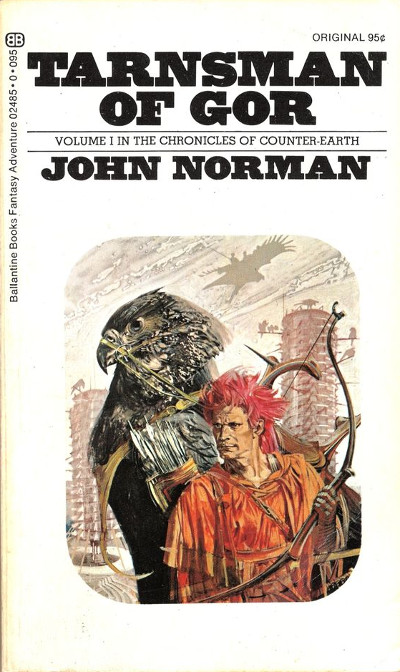 I’ve been meaning to read this book for a while, since I heard that it’s a classic of the Sword and Planet subgenre and I’ve really liked the other Sword and Planet books that I’ve read. (Princess of Mars, The Dying Earth, etc. Come to think of it, I haven’t done a review of Princess of Mars yet, so that’s as good a reason as any to reread it!)
I’ve been meaning to read this book for a while, since I heard that it’s a classic of the Sword and Planet subgenre and I’ve really liked the other Sword and Planet books that I’ve read. (Princess of Mars, The Dying Earth, etc. Come to think of it, I haven’t done a review of Princess of Mars yet, so that’s as good a reason as any to reread it!)
Besides the association with Sword and Planet, the Gor books have also spawned a subculture of BDSM, and for good reason. On Gor, slavery is not only normalized, it’s romanticized. A typical marriage ceremony consists of the groom binding up his bride, carrying her off on a giant bird, and throwing off her clothes to “show her people what had been the fate of [such and such girl].”
I don’t swing that way, but I thought I’d give the first book a try. I’d heard that the bondage fetishism doesn’t take over until the fifth or sixth book, and while it’s definitely there in Tarnsman of Gor, it wasn’t enough to make me put the book down.
As a swashbuckling action-adventure tale, I thought this book was pretty good. There definitely was no shortage of action, and while the plot twists were fairly predictable, they were also enjoyable and interesting. It’s a fun, if brutal book.
There were a lot of lengthy info-dumps, though, which wouldn’t have been so bad except that I had problems with the world. In general, it felt like the author had come up with a really cool world but not sufficiently thought it through. For example, if humans aren’t the apex predator on Gor, how are there so many human cities? If the caste system is maintained by deliberately sharing false information with the lower castes, how is that system long-term stable if the caste isn’t something you’re born into?
The general impression I got was that this world is a brutal, savage place where everyone is broken in some way, a lot like Mad Max. The thing is, I’m not sure that that’s what the author was going for.
That may just be an artifact of the time this book was written, though. A lot of older books that invented the tropes now seem stiff and wooden—not because they weren’t innovative for their time, but because we’ve seen those tropes so many times that we already know what to expect. Tarnsman of Gor was written back in the sixties, before role playing games and chihuahua-killing fantasy tomes had made world-building so important. Back then, it probably was enough to say “here’s a really cool world” without first thinking about all the ways to break it.
Again, that wouldn’t be so bad if all this book attempted to be was a swashbuckling adventure on another world. But at several key points, the narrator steps back from the story to explain some aspect of the world that was only tangentially related to the plot.
All in all, I give this book three stars. It’s worth reading if it interests you, but it’s not a must-read.